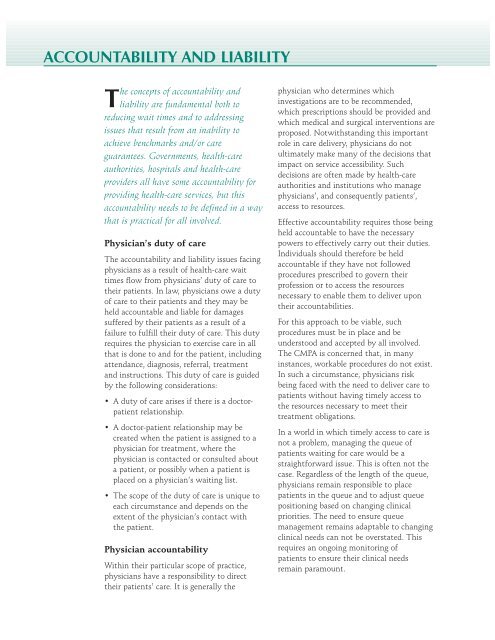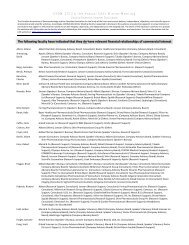Wait Times A Medical Liability Perspective - The Canadian ...
Wait Times A Medical Liability Perspective - The Canadian ...
Wait Times A Medical Liability Perspective - The Canadian ...
Create successful ePaper yourself
Turn your PDF publications into a flip-book with our unique Google optimized e-Paper software.
ACCOUNTABILITY AND LIABILITY<strong>The</strong> concepts of accountability andliability are fundamental both toreducing wait times and to addressingissues that result from an inability toachieve benchmarks and/or careguarantees. Governments, health-careauthorities, hospitals and health-careproviders all have some accountability forproviding health-care services, but thisaccountability needs to be defined in a waythat is practical for all involved.Physician’s duty of care<strong>The</strong> accountability and liability issues facingphysicians as a result of health-care waittimes flow from physicians’ duty of care totheir patients. In law, physicians owe a dutyof care to their patients and they may beheld accountable and liable for damagessuffered by their patients as a result of afailure to fulfill their duty of care. This dutyrequires the physician to exercise care in allthat is done to and for the patient, includingattendance, diagnosis, referral, treatmentand instructions. This duty of care is guidedby the following considerations:• A duty of care arises if there is a doctorpatientrelationship.• A doctor-patient relationship may becreated when the patient is assigned to aphysician for treatment, where thephysician is contacted or consulted abouta patient, or possibly when a patient isplaced on a physician’s waiting list.• <strong>The</strong> scope of the duty of care is unique toeach circumstance and depends on theextent of the physician’s contact withthe patient.Physician accountabilityWithin their particular scope of practice,physicians have a responsibility to directtheir patients’ care. It is generally thephysician who determines whichinvestigations are to be recommended,which prescriptions should be provided andwhich medical and surgical interventions areproposed. Notwithstanding this importantrole in care delivery, physicians do notultimately make many of the decisions thatimpact on service accessibility. Suchdecisions are often made by health-careauthorities and institutions who managephysicians’, and consequently patients’,access to resources.Effective accountability requires those beingheld accountable to have the necessarypowers to effectively carry out their duties.Individuals should therefore be heldaccountable if they have not followedprocedures prescribed to govern theirprofession or to access the resourcesnecessary to enable them to deliver upontheir accountabilities.For this approach to be viable, suchprocedures must be in place and beunderstood and accepted by all involved.<strong>The</strong> CMPA is concerned that, in manyinstances, workable procedures do not exist.In such a circumstance, physicians riskbeing faced with the need to deliver care topatients without having timely access tothe resources necessary to meet theirtreatment obligations.In a world in which timely access to care isnot a problem, managing the queue ofpatients waiting for care would be astraightforward issue. This is often not thecase. Regardless of the length of the queue,physicians remain responsible to placepatients in the queue and to adjust queuepositioning based on changing clinicalpriorities. <strong>The</strong> need to ensure queuemanagement remains adaptable to changingclinical needs can not be overstated. Thisrequires an ongoing monitoring ofpatients to ensure their clinical needsremain paramount.


